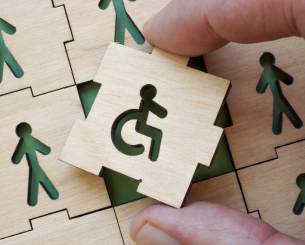Facing Discrimination Because of a Disability? Know Your Rights
Disability discrimination in the workplace is not only unfair — it’s illegal. If you’ve been treated differently, denied reasonable accommodations, or faced retaliation because of a physical or mental condition, you may have a legal claim. Don’t stay silent — know your rights and take action.
4.9 Overall Rating
10,000+
Clients Helped
$100M+
Recovered
Free Case Consultation within 24 hours
Don’t lose benefits due to delay. No-fee guarantee
What Is Disability Discrimination?
Disability Discrimination occurs when an employee or job applicant is treated unfairly because of a physical or mental disability. This includes a broad range of unlawful behavior that can interfere with your ability to obtain or keep a job, perform your duties, or enjoy equal terms and conditions of employment.
Under laws like the Americans with Disabilities Act (ADA) and California’s Fair Employment and Housing Act (FEHA), employers are required to provide reasonable accommodations and are prohibited from discriminating in hiring, promotion, termination, or other employment practices.
👉 If you’ve been denied a job, accommodation, or fair treatment because of a disability, you may have a legal claim. Know your rights and take action.

Common Examples of Disability Discrimination:
❌ Refusing to hire or promote someone because of their disability or medical history
❌ Denying reasonable accommodations that would allow an employee to perform essential job functions
❌ Harassing or creating a hostile work environment based on a disability
❌ Terminating or demoting an employee for taking medical leave or requesting accommodations
❌ Treating a disabled employee as “less capable,” excluding them from opportunities or assignments
❌ Retaliating against an employee for asserting their rights or filing a complaint
You Are Protected by California and Federal Law
Both California and federal law strongly protect employees with disabilities and require employers
to engage in a good-faith interactive process to accommodate their needs.

California Law – FEHA (Gov. Code §§ 12940 et seq.)
Under the California Fair Employment and Housing Act (FEHA):
- It is unlawful for an employer to discriminate against an employee because of their physical or mental disability (§ 12940(a))
- Employers must provide reasonable accommodations unless doing so would cause undue hardship (§ 12940(m))
- Employers are required to engage in a timely, good faith, interactive process to determine effective accommodations (§ 12940(n))
- Harassment based on disability is prohibited (§ 12940(j))
- Retaliation for asserting disability rights or requesting accommodation is also unlawful (§ 12940(h))
FEHA protections apply to California employers with five or more employees, offering broader protections than federal law.

Federal Law – Americans with Disabilities Act (ADA), 42 U.S.C. § 12101 et seq.
Under the ADA:
- Employers may not discriminate “against a qualified individual on the basis of disability” in any aspect of employment (§ 12112(a))
- Employers must make reasonable accommodations for known disabilities unless it would impose an “undue hardship” (§ 12112(b)(5)(A))
- “Qualified individuals” are those who can perform the essential functions of the job with or without accommodation
- The ADA applies to private employers with 15 or more employees

What Is a Reasonable Accommodation?
A reasonable accommodation is any adjustment or modification to a job, work environment, or work schedule that enables a disabled employee to perform essential job duties. Examples include:
- Modified work schedules
- Ergonomic equipment
- Remote work or telecommuting options
- Extended medical leave
- Reassignment to a vacant position
If you request accommodation, your employer must engage in an interactive dialogue to assess your needs and explore potential solutions. Refusing to even have that conversation is a violation of law.
Disability Discrimination Benefits & Rights
What Benefits Can You Expect?
Get a free case evaluation within 24 hours.
Don’t lose benefits due to delay | No-fee guarantee
READ OUR BLOG
Understanding Your Rights: Disability Discrimination in the Workplace
This post explains what constitutes disability discrimination under the ADA and California law, helping employees recognize unlawful treatment and know when to take action.
Reasonable Accommodations: What Employers Must Provide
Learn about the legal obligation employers have to provide reasonable accommodations to disabled employees and how to request them effectively.
Got A Question?
We’ve Answers.
Disability discrimination occurs when an employer treats a qualified employee or applicant unfavorably because of a disability, including failure to provide reasonable accommodations.
The Americans with Disabilities Act (ADA) and California’s Fair Employment and Housing Act (FEHA) protect individuals from discrimination based on physical or mental disabilities.
A reasonable accommodation is any change to the work environment or job duties that enables a person with a disability to perform essential functions of the job — such as modified work hours, assistive devices, or remote work options.
No. It is illegal to terminate an employee solely due to a disability, especially if they can perform the essential functions of the job with or without reasonable accommodation.
Document the incidents, report the issue internally (e.g., to HR), and consult an employment attorney. You may be able to file a claim with the EEOC or California’s Civil Rights Department.
Follow us on Instagram
View this profile on InstagramEmployees First Labor Law - Jonathan P. LaCour, Esq. (@employeesfirst) • Instagram photos and videos
Contact EFLL for Help Today
If your injury has taken you off the job or reduced your income, temporary disability benefits are your right under California law. If you’re not being paid correctly — or at all — don’t wait.
Request A Free Consultation:
OFFICE LOCATIONS
EMPLOYEES FIRST LABOR LAW - LONG BEACH
- One World Trade Center, 8th Floor Long Beach, CA 90802







